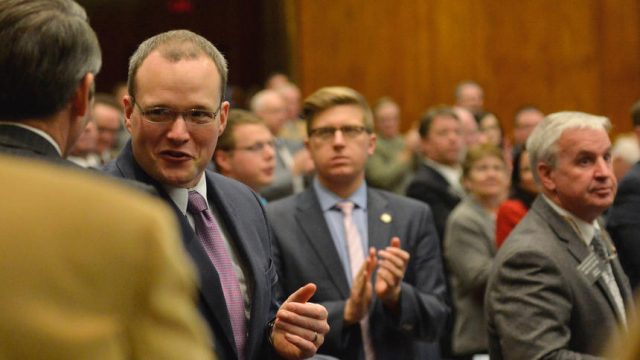Democrat Minority Leader Mac Schneider: I’m Right About Oil Taxes in an Alternate Version of Reality

Senate Minority Leader, Mac Schneider, and Assistant House Minority Leader, Corey Mock, welcome their constituents before the State of The State Address on Tuesday, Jan 6, 2015, at the State Capitol in Bismarck, N.D. (Logan Werlinger/Grand Forks Herald)
Last week I called out Senator Mac Schneider and Rep. Kenton Onstad for a wildly inaccurate claim they made in a newspaper column, which is that Republican-backed oil tax reform was costing the state $11 million per month in revenues.
Here’s a direct quote from what they wrote: “The oil extraction tax cut, ramrodded through the 2015 Legislature in a matter of days during the close of the session, now is costing the state an estimated $11 million per month.”
I debunked that nonsense, pointing out that according to actual, real-world tax collections the reforms passed by the Legislature have resulted in $183 million in additional revenues:

Based on this factual data you’d think what Senator Schneider owes us is an apology. Instead he decided to double down on his falsehoods with a letter to the Fargo Forum today responding to me and arguing that his claim of $11 million in lost revenues per month would be accurate in an alternate version of reality where the Legislature created a different rate:
In a recent newspaper column, we said the “[t]he oil extraction tax cut, ramrodded through the 2015 Legislature” by the Republican majority “in a matter of days during the close of the session, now is costing the state an estimated $11 million per month.” Since then, a Forum Communications blogger has alleged this was not a “true statement[,]” going so far as to call it “wildly inaccurate.”
Except it’s not inaccurate. It’s a fact.
Had the Republican majority eliminated the troublesome “trigger” incentive—as every member of the North Dakota Senate voted to do on a bipartisan basis in 2013 and again in 2015—and simply left the 6.5 percent extraction tax rate alone, the state would indeed be collecting “an estimated $11 million” more “per month]” according to data from the nonpartisan Legislative Council.
Schneider is acknowledging that eliminating the oil tax trigger was a good idea, but he’s arguing that in an alternate version of reality where the Legislature kept the top oil taxes at 11.5 percent the state would be taking in an additional $11 million per month.
This is the sort of presumptuous, mealy-mouthed, bait-and-switch nonsense that causes voters to hate politicians.
By Schneider’s logic, Republicans are also costing the state money by failing to raise income taxes or something.
Schneider is trying to create the impression with voters that Republican-backed reforms to the state’s oil taxes has contributed to the state’s current budget shortfall. But that’s simply not true. Per the Tax Commissioner’s office, oil companies are currently paying an effective tax of 9.8 percent. Had the Legislature not acted, they would have been paying a 6.1 percent rate.
That differential in rates has, again, contributed to a $183 million tax hike on oil companies so far in 2016.
That Republicans also lowered the top rate oil companies will pay when prices are higher is irrelevant in terms of the current budget situation. The oil companies wouldn’t have been paying that top rate right now anyway under the oil tax structure. And when oil prices inevitably rise again the increase in drilling and commerce that accompanies it will far outweigh the few percentage points in reduction they got from the previous top rates.
What Republicans passed was good reform. They took away a massive tax exemption triggered by low oil prices and replaced it with a flatter, and slightly lower tax structure. This has resulted in more, not less, revenues so far in 2016.
Hidebound ideologues like Schneider hate that sort of give-and-take. Thank goodness Schneider and his fellow liberals sit on the sidelines of state policy making.
Schneider can say what he wants about this alternate universe he’s created for the purposes of his talking points, but out here in the real world that reform is looking pretty good.




